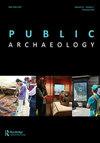Indigenous Archaeologies of Crete, 1878–1913
IF 0.9
4区 历史学
0 ARCHAEOLOGY
引用次数: 0
Abstract
This article makes a contribution to the emerging study of alternative, indigenous and subaltern archaeologies, using the Mediterranean island of Crete as a case study. My focus is on the crucial political developments that took place during the late nineteenth and early twentieth centuries, particularly the establishment of the Cretan State. These developments coincided with and facilitated the consolidation of archaeology as a scientific discipline and a state policy on the island. The Cretan population of the countryside ‘contested’ the new attitudes towards the material past by persevering with embedded practices that questioned the validity of scientific approaches. What kind of indigenous imagination underscored such practices? And how did the peasants interact with the new dogma regarding antiquities? Contrary to other groups involved, such as local and Western archaeologists, the rural Cretans remain among the ‘great unknowns’: accounts of relevant events by their own pen are scarce, highlighting the importance of oral historical sources. I therefore present these people through the voices of the others. Archival material such as administrative documents, correspondence, memoirs and newspaper articles, critically assessed, are used for this purpose. This research is also influenced by autobiographical archaeology, as glimpses of my personal work experience and family background overlap with the archival data discussed here.克里特岛的土著考古学,1878-1913
本文以地中海克里特岛为例,为新兴的另类、本土和亚另类考古研究做出了贡献。我的重点是十九世纪末和二十世纪初发生的重要政治发展,特别是克里特岛国家的建立。这些发展与考古学作为一门科学学科和一项国家政策在岛上的巩固相吻合,并为其提供了便利。乡村的克里特人通过坚持质疑科学方法有效性的根深蒂固的做法,“质疑”了对物质过去的新态度。什么样的本土想象力强调了这种做法?农民是如何与关于古物的新教条互动的?与当地和西方考古学家等其他相关群体相反,乡村克里特人仍然是“巨大的未知数”:他们自己的笔下对相关事件的描述很少,这突出了口头历史来源的重要性。因此,我通过其他人的声音来介绍这些人。经过严格评估的行政文件、信件、回忆录和报纸文章等档案材料用于此目的。这项研究也受到自传考古学的影响,因为我个人工作经历和家庭背景的一瞥与这里讨论的档案数据重叠。
本文章由计算机程序翻译,如有差异,请以英文原文为准。
求助全文
约1分钟内获得全文
求助全文

 求助内容:
求助内容: 应助结果提醒方式:
应助结果提醒方式:


